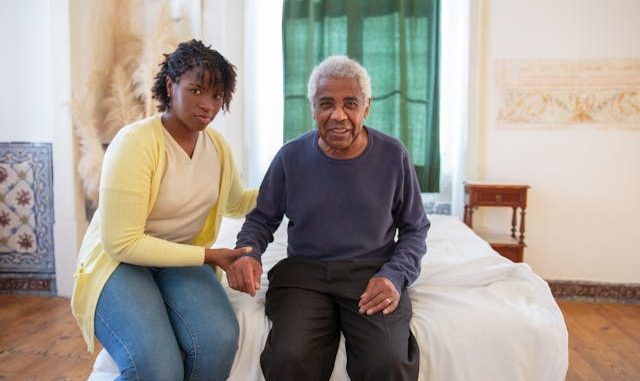

- Develop a comprehensive care plan with clear responsibilities to manage elderly care effectively.
- Use technology like emergency systems, medication apps, video monitoring, and telehealth services for better care.
- Hire trained home service providers to ensure quality care and reduce family caregiver burden.
- Build a support network with friends, family, and support groups for emotional and practical assistance.
- Ensure caregivers take time for themselves to maintain their well-being and provide better care.
Taking care of elderly family members can be a rewarding but challenging responsibility. Balancing work, personal life, and caregiving duties can sometimes be overwhelming. However, with some strategic planning and organization, you can make elderly care more convenient for your loved one and yourself. This blog will discuss essential tips to help make elderly care more manageable and less stressful for families.
Create a Care Plan
The first step in making elderly care more convenient is to create a comprehensive care plan. Sit down with your loved one and other family members to discuss their needs, preferences, and schedule. Determine what tasks need to be done daily, weekly, or monthly and assign responsibilities accordingly. Having a clear plan in place will help everyone stay on the same page and ensure that all aspects of care are covered.
Utilize Technology
Technology can be a valuable tool in making elderly care more convenient. There are many tools that can provide peace of mind for both you and your loved one while allowing them to maintain their independence. Here are four examples of how technology can assist in elderly care:
Personal Emergency Response Systems

These systems allow seniors to call for help with the push of a button and connect them with emergency services or a designated caregiver. Some systems also have fall detection capabilities, which can automatically call for help if a fall occurs.
Medication Management Apps
These apps can be programmed to send reminders when it’s time to take medication or reorder prescriptions. They can also track medication adherence and provide reports to family members and healthcare professionals. You can also set up automatic refills to save time and hassle.
Video Monitoring
Installing cameras in your loved one’s home can allow you to check on them remotely and ensure their safety. Some systems even have motion detection capabilities, sending alerts if there is any unusual activity or if your loved one falls.
Virtual Telehealth Services

Telemedicine has become increasingly popular during the COVID-19 pandemic, allowing seniors to connect with healthcare professionals without leaving their homes. Virtual appointments can be especially beneficial for those with mobility issues or chronic conditions that require frequent check-ins.
These are just a few examples of how technology can assist in elderly care. It’s essential to do research and find the right tools that fit your loved one’s specific needs and preferences. With the help of technology, you can provide better care for your elderly loved ones while also giving them the freedom to live independently.
Seek Professional Help
Don’t hesitate to seek professional assistance when needed. Hiring an experienced and caring home service provider can provide much-needed relief for family caregivers. They are trained to handle various aspects of elderly care, allowing you to focus on other responsibilities without compromising the quality of care provided. Additionally, they can offer valuable advice and resources for managing your loved one’s health conditions.
Establish a Support System
It’s essential to build a support system to help you navigate the challenges of elderly care effectively. Reach out to friends, family members, or local support groups for emotional support or practical help when needed. Having someone to talk to or lend a helping hand can make a significant difference in reducing caregiver burnout and improving overall well-being. Additionally, joining online communities or forums for caregivers can provide a sense of camaraderie and valuable information from others who have gone through similar experiences.
Take Care of Yourself
Lastly, don’t forget to prioritize self-care as a family caregiver. It’s easy to get caught up in taking care of others and neglecting your own needs. Make time for things that bring you happiness and peace, whether it’s working out, reading, or spending time with friends. Remember that you cannot pour from an empty cup – taking care of yourself will ultimately benefit both you and your loved one.
Taking care of elderly family members can be demanding, but with proper planning, technology, professional assistance, and a strong support system, it becomes more manageable. Remember to create a comprehensive care plan, utilize helpful technologies, seek professional help, and build a support network. Most importantly, ensure you take time for self-care to maintain your well-being. With these strategies, you can provide effective and compassionate care for your loved ones while also taking care of yourself.
Leave a Reply
You must be logged in to post a comment.